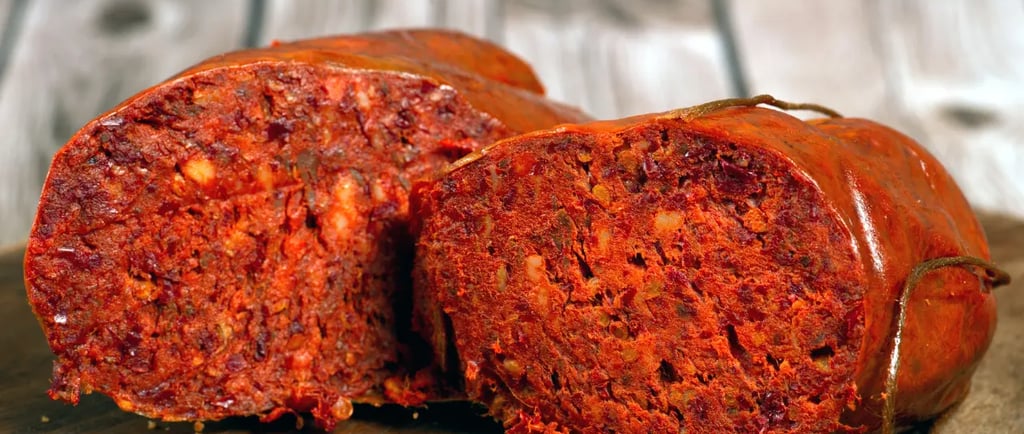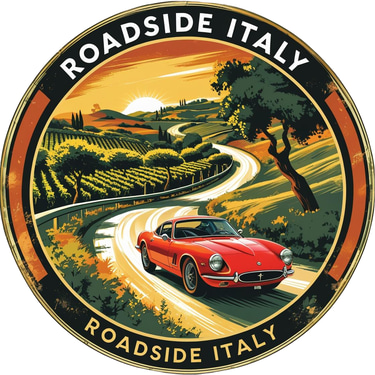Nduja Calabrese: The Spicy King of Calabrian Foods
From Calabria villages to modern pasta recipes, explore nduja salami, sauces, wine pairings, and insider tips.
FOODCALABRIA


The first time someone handed me a piece of crusty bread slathered with bright red 'nduja calabrese, I honestly had no idea what I was getting into. One bite, and my mouth was on fire — but in the most incredible way possible. The heat wasn't just burning; it was complex, smoky, almost sweet, with this rich, meaty depth that made me immediately crave another bite. That was my introduction to what I now consider one of Italy's most addictive flavors.
If there's one taste that perfectly captures the wild, passionate spirit of southern Italy, it's definitely 'nduja. This fiery, spreadable pork creation has conquered kitchens all over the world, but trust me — to really understand its magic, you need to experience it in the rugged, sun-baked landscapes where it was born.
What Exactly Is Nduja?
Here's the thing about 'nduja salami — it breaks all the rules of what you think Italian cured meat should be. Instead of being firm and sliceable, it's this gorgeously soft, almost creamy spread made from cuts of pork fat and meat, then loaded with Calabria's legendary sun-dried chili peppers. The result? Something smoky, spicy, and utterly spreadable that stands completely alone among Calabrian foods.
I love how 'nduja refuses to be categorized. It's like pâté met salami and decided to become something entirely new. You can spread it on toasted bread for the ultimate appetizer, stir it into pasta sauces for instant depth, or melt it into stews for that perfect kick of heat and richness. It's rustic, bold, and so deeply connected to Calabria's wild character.
The Origins in Calabria
The heart of 'nduja beats strongest in tiny Spilinga, this incredible little town perched on the Tyrrhenian coast. Walking through its narrow streets, you can almost feel the centuries of tradition — locals have been crafting this spicy masterpiece here for generations, originally using pork trimmings and those abundant Calabrian chilies as a brilliant way to preserve meat through harsh winters.
What I find fascinating is how every single community throughout the Calabria towns has developed its own personality for 'nduja. Some make it searingly hot, others focus on smokiness, some prefer it chunky while others go silky smooth. But the soul remains the same everywhere: it's pure celebration of flavor born from necessity and incredible creativity.
How Nduja Is Made
Making authentic 'nduja salami is honestly like watching poetry in motion. Pork fat and meat get ground together in perfect proportions, then mixed with crushed chili peppers, salt, and secret family spices that each producer guards jealously. This gorgeous, fiery mixture gets packed into large casings, gently smoked over fragrant wood, and aged until it develops that characteristic richness that makes your taste buds sing.
Calabria's incredible climate plays a starring role here too. That perfect balance of sea air, intense Mediterranean sun, and cool mountain winds creates exactly the right conditions for proper curing. It's honestly no wonder this region has become one of Italy's greatest food treasure troves!
Nduja in the Kitchen
While traditionalists (and honestly, I totally get this) love it simply spread on warm, crusty bread, creative chefs worldwide have discovered endless ways to showcase this fiery delight.
Nduja Sauce
One of the easiest ways to transport your kitchen straight to Calabria is through a proper nduja sauce. Just melt a generous spoonful of 'nduja into a simple tomato base, and boom — you instantly have this silky, spicy condiment that elevates everything it touches. Pasta, grilled seafood, roasted vegetables — they all become something special.
Nduja Pasta Recipes
Italy runs on pasta, and Calabria definitely doesn't disappoint! Some of my favorite nduja pasta recipes involve tossing perfectly al dente spaghetti or rigatoni with a sauce of San Marzano tomatoes, garlic, and melted 'nduja that coats every strand. Finish with a generous sprinkle of sharp pecorino, and you've got a dish that literally tastes like southern Italian sunshine on a plate.
Other Creative Uses
The versatility of 'nduja honestly blows my mind. I've seen it transform pizza into something transcendent, turn simple scrambled eggs into a gourmet breakfast, elevate soups from good to unforgettable, and make risotto absolutely sublime. It has this magical ability to turn the simplest dish into something with serious depth and that perfect kiss of heat.
Pairing Nduja with Calabria Wine
The boldness of 'nduja absolutely demands an equally bold partner, and the locals have figured this out perfectly. They love pairing it with Calabria wine, especially robust reds like Cirò, made from the indigenous Gaglioppo grape. These wines are earthy, slightly spicy themselves, and have exactly the right intensity to stand up to 'nduja's fiery personality.
For something lighter (which honestly works beautifully too), try a crisp white Greco or Pecorello. The clean, fresh flavors create this amazing contrast that refreshes your palate between those rich, spicy bites.
Beyond Food – The Spirit of Calabria
Here's what gets me emotional about 'nduja: eating it connects you to something much bigger than just a delicious spread. It's like tasting the rugged soul of Calabria itself — those dramatic mountain villages, the wild coastline, the people who've learned to create magic from simple ingredients.
Exploring the remote Calabria villages, you quickly realize that life here revolves around food, family festivals, and the ancient rhythms of the seasons. This deep sense of community and heritage is exactly what gives Calabria food its incredible soul. 'Nduja isn't just something delicious to eat — it's a symbol of resilience, creativity, and the warmth that defines southern Italian culture.
Not Everyone Knows
Every August in Spilinga, the entire town goes 'nduja-crazy during the Sagra della Nduja — a festival dedicated completely to this spicy treasure. The streets fill with stalls serving every imaginable variation of 'nduja dishes, and the energy is absolutely infectious!
Here's something that always amazes people: historically, 'nduja was considered "poor man's salami," created from leftover cuts that might otherwise go to waste. Today? It's a gourmet ingredient that Michelin-starred chefs fight over and food lovers seek out specifically.
In some remote corners of Calabria, families still make their own 'nduja at home, following recipes whispered down through generations. It's one of those traditions you rarely find anywhere else, and honestly, tasting homemade 'nduja is like experiencing a piece of living history.
FAQ
Is 'nduja very spicy?
It definitely brings the heat, but here's the beautiful thing — it's so much more flavorful than just hot. Those Calabrian chilies contribute smokiness, unexpected sweetness, and incredible depth. It's not just fire; it's a complete flavor experience.
Where can I buy authentic 'nduja?
The real deal comes from Calabria, especially from Spilinga where it all began. Look for DOP-labeled products or find trusted Italian food importers who source directly from the region. Trust me, the authentic stuff is worth seeking out!
How long does 'nduja last once opened?
Store it in the fridge and cover the surface with a thin layer of good olive oil to protect it from air. Treated properly, it can last several delicious weeks — though honestly, good luck making it last that long!
Can I make my own 'nduja at home?
It's technically possible, but incredibly challenging without Calabria's specific climate and proper smoking conditions. For the real experience, buying from authentic Calabrian producers is definitely your best bet.
What drinks pair well with 'nduja?
Those robust Calabrian reds are the traditional choice and absolutely perfect, but I've discovered that sparkling wines and crisp whites create these amazing contrasts that work beautifully too. Don't be afraid to experiment!
